Meat News
Lamb farmers and producers are being urged to ensure their sheep are vaccinated as autumn arrives.
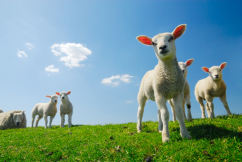
The appeal comes after the results of AHDB Beef & Lamb’s Fallen Stock initiative revealed that certain illnesses in lambs were more prominent during the autumn months.
Research from the project, which ran from April 2014 to June 2015, showed that pulpy kidney, a common clostridia disease, was at its highest levels during October 2014 for lambs receiving hard feed.
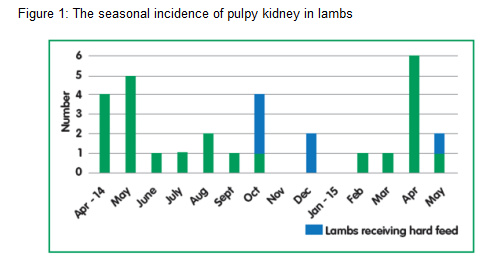
It is believed this can be attributed to a change in their natural diet as the seasons change. Where lambs had been receiving hard feed, most had not received a booster prior to the change in diet.
Furthermore, immunity that they might have obtained from drinking colostrum at birth might have worn off by this time, implying that a vaccination booster could aid them.
“If producers are keeping store lambs during this period, they should be vaccinated ahead of any anticipated adverse weather or other stressors such as moving,” claimed Dr Liz Genever, senior sheep and beef scientist.
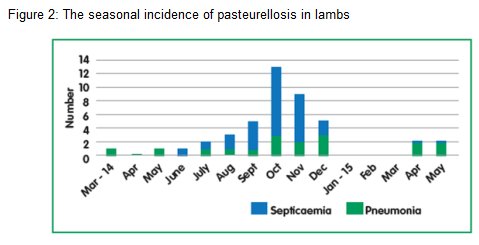 “Lambs that are vaccinated when they are young, from one-month-old, may lose their immunity by the autumn if not given a booster around September.”
“Lambs that are vaccinated when they are young, from one-month-old, may lose their immunity by the autumn if not given a booster around September.”
In addition, the research also proved that cases of pasteurella deaths reached new heights in lambs during October.
“There is a clear need for this, as lambs had been vaccinated according to the data sheet in only 12% of the outbreaks monitored,” added Genever.
“These diseases can be prevented by the administration of appropriate vaccines and should be done as soon as possible.”
Leaders in the butchery industry have warned against using apprenticeships as a replacement for offering staff a competitive wage.
A Meat Trades Journal online survey found that around 70% would consider taking on more apprentices in response to rising minimum wages. Announced in the Budget earlier this year, the National Living Wage will increase to £7.20 as of 1 April 2016. This will increase further in 2020 to £9, for those aged 25 and over. This comes as government approval to launch a brand new ‘Trailblazer’ apprenticeship scheme for butchery was given earlier this month.
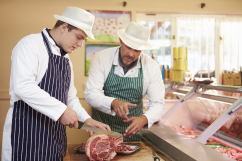
Advocate for Apprenticeships, Lucianne Allen of Aubrey Allen said it was vital to pay a fair wage to those in the industry and that apprentices should be seen as an opportunity to teach a craft rather than cut costs. Aubrey Allen currently has seven apprenticeships in its business and is looking to take on more in the near future.
“Butchery is a fantastic craft but a hardworking one and there’s no point in having apprentices if they don’t feel that they have a future in an industry that will invest in them long-term. We have to make ourselves competitive as employers and that includes offering a competitive wage.”
She said that apprenticeships should still be considered by those looking to attract new people to the industry. “Apprenticeships are a fantastic opportunity to be paid while you train, when previously a person would have had to pay to learn, but they are certainly not a substitute for experienced staff.”
Noel Collett, chief executive officer of the Crawshaw Group agreed businesses should not use apprentices as a cheap option. The group is currently on a recruitment drive and hopes to create 2,500 jobs over the next five years. “The National Living Wage will clearly put many businesses under financial pressure. However, when looking to recruit quality staff with a specific skill set, businesses like ours will need to plan accordingly and pay the correct level,” he said.
“On the topic of apprenticeships, we view the scheme as a great mechanism for introducing new people into the butchery industry to develop a new career, irrespective of their qualification or experience, and would not use the scheme as a cost-cutting exercise. They are two very different challenges and businesses should invest in the people resource by paying them a fair wage.”
Almost £92m in extra sales could be generated if the meat industry pursued new product development opportunities proposed by AHDB Beef & Lamb, according to the sector group.
Dick van Leeuwen, AHDB Beef & Lamb business development manager, highlighted the benefits of creative cuts to delegates at its ‘A World of Innovation’ conference at the Tower of London earlier this month.
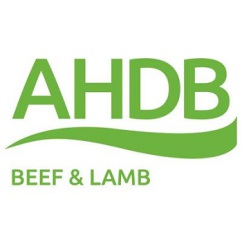
The biggest gain could be achieved by seam butchering lamb legs and selling them as topside mini-joints, thick flank mini-joints, silverside mini-joints and shanks instead of bone-in leg joints, he argued. That could result in an extra £63.2m in annual retail sales, he estimated.
Seam butchering beef shoulder and selling it as boneless Victoria Roasts as opposed to bone-in shoulder joints could also add over £5m to the annual retail sales value of the shoulder, he said.
In addition, he urged retailers and processors to explore tri-tip steaks, which had already seen real growth in popularity across Europe and America.
He urged butchers: “Continue to work on the quality and consistency of cuts and better butchery. There’s potential value in some cuts, which we overlook.”
Separately, conference attendees heard about trials on microwaveable bags for cooking raw meat by UK firm Excelsior Technologies, which it is testing with US partners.
“As it cooks, it expands and the air heats up and cooks the product,” explained Steve Wald, executive director for innovation at the Beef Innovations Group.
Wald said technology was evolving to the point where microwave cooking could produce much better- quality meat dishes than it used to.
He hoped commercial use of the bags could begin in the US from early 2016.
Pork Farms Group has been rebranded with there new name being, Addo Food Group
Meaning ‘to inspire’ in Latin, Addo will be the group’s new identity as it looks to grow following the acquisition of the chilled savoury pastry business of Kerry Foods in 2014.
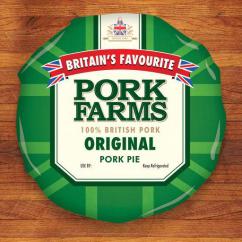
The Kerry acquisition means the group has added the Poole Bakery in Dorset and Spalding Bakery in Lincolnshire.
Chris Peters, group managing director of Addo Food Group, said: “Addo is the new name for the former Pork Farms Group and means ‘to inspire’, representing how we think and the relationship we have with our people and our customers. At Addo we have a true passion for food and this is evident in the quality, taste and range of our products.
“With the recent addition of new sites and brands following our acquisition of Kerry’s chilled savoury pastry business, we wanted a new group name to represent our identity as a forward-thinking and innovative food company, and to allow us to demonstrate our new breadth of products and brands.
“With roots that stretch back more than 160 years, Addo has established a long-trusted tradition of providing delicious, high-quality food, produced to the highest standards, using the best-quality ingredients. And as a forward-thinking company, we are always looking to the future and using consumer insight, exciting new techniques, and pioneering research and development to change the boundaries of our category.
Addo sells 256 million products every year under both its own brands and the brands of its major retail partners and has sales revenues of £270m and a market share of 34%.
The new brand is being launched through new signage across the Addo estate and will also see its Queens Drive business unit (home of Pork Farms Pies) in Nottingham renamed as Tottle Bakery and its Shaftesbury site rebranded to Dorset Foods.
Pork supplier Karro Food Group has delivered a significant annual profit following a period of transformation.
It has posted an EBITDA profit of £8m for the year ended 31 December 2014, representing an £11m improvement on the previous year and the group’s first profit for many years.
The group’s turnover was £528m, similar to the previous year.
The company has had a tumultuous year – securing a £74m funding package from GE Capital and RBS Invoice Finance to support UK and international expansion and an acquisitions strategy in May, while in March it laid off 141 members of staff.

It also launched a £10m capital investment programme, financed from cash generated by the business, into processing and production across its UK manufacturing facilities, including an £8m leading investment at its largest facility in Northern Ireland –
Di Walker, executive chair of Karro Food Group, said: “Following its acquisition from Vion by private equity house Endless LLP in January 2013, Karro Food Group implemented a five-year plan to transform the underlying performance of our business through operational improvements that could deliver value to both Karro and its customers.
“It is therefore extremely positive to announce that Karro Food Group will have achieved the targets set out in that plan – namely to ensure Karro is fit for the future and firmly focused on growth – within just three years. This is an achievement reflected in these stand-out results and a clear recognition from our customers that the revitalised group is a very welcome market participant.
Walker added that the results would enable Karro to expand in the UK and internationally.
“Our firm focus moving forward is to continue this positive trajectory. We have an appetite to make acquisitions and this strategy will be supported by our recently announced £74m funding package.
“We also continue to be focused on organic growth and will further develop our retail and trade partnerships, as well as expand our international customer network in markets including Australia, China, Japan, South Korea and the USA.”
Chief financial officer Michael Kestemont said that the second year of Karro’s profit growth had been realised in a year characterised by significant competitive pressure within the UK pork industry.
He said: “With ongoing support of our funding partners, Karro Food Group is confident that 2015 will bring significant EBITDA and cash generation progression, driven by further capital investment and continuous operational and commercial improvements across the group.
“The increasing and consistent success of Karro Food Group and its strong financial performance is giving both suppliers and customers the confidence to want to grow long-term strategic partnerships with the group, cementing our position as a leading player in the UK and international pork industry.”
Three young butchers have been chosen to represent the UK at this year’s International Young Butcher Competition (IYBC), taking place later this month in the Netherlands.
The butchers who will be flying the Union Jack are Chris Riley, from the Huntingdon branch of Walter Smith Butchers, Peter Rushforth from Swans Farm Shop in Mold, Wales and George Parker of Frank Parker Butchers in Warwickshire.
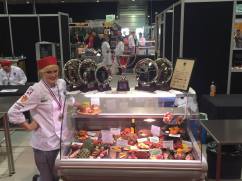
The butchers have to compete in six separate categories to display their skills in the bid to win the coveted title. This year will see the introduction of a ‘surprise’ category, where the competitors will be presented with a mystery box. Despite the new challenge, the young British butchers are not phased by this.
“You’ve got to be confident,” said 22-year-old Riley. Having already won several accolades, he is no stranger to competition.
“I always think you should aim high. If you’re going to go to a competition, then you should always aim for first place.”
Riley has previously won the Premier Young Butcher Competition, where he narrowly beat fellow competitor Rushforth to the top. “Next thing you know I’ve won that and everything has come together, and now I’m representing England,” exclaimed Riley. “It’s a dream come true.”
Rushforth, who has in the past won the Welsh Young Butcher of the Year, is feeling “overwhelmed” to have been chosen to represent the UK. However, he remains poised for when the competition takes place. He explained: “My confidence has grown week by week with the more practice I put in. It was a bit daunting at first because it’s quite a big deal.”
To ensure they are ready for the competition, the hopefuls have been receiving regular tuition from UK team coach and industry consultant Viv Harvey, alongside esteemed butcher Marco Peerdeman.
Keith Fisher, AHDB butchery development manager and chief executive of the Institute of Meat, will also be acting as UK judge. He will travel to Belgium with Harvey and the competitors later in the month when the competition gets under way.
The International Young Butcher UK Team is organised by the National Federation of Meat and Food Traders and is sponsored by ABP Food Group (UK), AHDB Beef & Lamb, AHDB Pork, Dalziel, the Institute of Meat, Leeds City College, Orange Butcher, Raps (UK), Weddel Swift and the Worshipful Company of Butchers.
Kerry Foods’ sausage brand Richmond is going for the try with its new rugby-inspired limited-edition flavors.

Available in grocery and impulse from September, the limited-edition flavours join the existing range and feature traditional tastes from around the UK, such as Scrum Cumberland, Line-Out Lincolnshire and Penalty Pork & Leek.
The brand’s original sausages will also get a rugby-inspired makeover for a limited period. The new flavours and packaging will be available for a limited time only.
“This is an ideal time to launch a disruptive ‘when they’re gone, they’re gone’ style range that we believe will add incremental sales and turnover to the category,” said Joe Hunter, brand manager for Richmond.
“We know that events throughout the year drive sales and the sausage category has natural seasonal peaks. Richmond tends to own big family moments such as Easter and Christmas, and to leverage that natural seasonal uplift even further, we are launching a limited-edition range of new flavours for the first time, to drive engagement and footfall within the category while exciting our existing customers.”
The limited-edition variants will be available in eight-packs and will be supported in-store marketing.
Eight firms are taking part in the pig industry scholarship scheme, run by AHDB Pork and Harper Adams
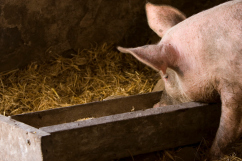
The next stage in the process is for the companies taking part to attend the scholarship fair taking place in October (this year). Here they will find the students they need.
“This year we have four new companies that have agreed to take part,” said skills and training co-ordinator Sam Bowsher.
“Overall that is slightly fewer than last year, but that is good for the industry as there is a constant flow of new firms which are providing opportunities for students. Existing companies are encouraged to dip in and out, according to the needs of the business.”
The training scheme is now in its third year. The students who are taken onto the scholarship programme will take part in a year-long placement. The sponsoring firm may be able to offer a post for the student once they qualify from the programme
Moy Park has invested £180,000 in four incubators at its hatchery in Craigavon, Northern Ireland.
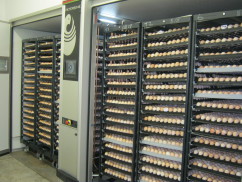
The new incubators increase capacity at the parent stock hatchery by 16% and give Moy Park greater control over temperature, humidity and ventilation.
As well as improving hatchability, the new technology enhances the welfare of the chicks by monitoring and supplying precise levels of fresh air and oxygen for eggs and chicks at all times during incubation. The incubators also consume 20% less energy that previous machines.
This investment follows Moy Park’s recent announcement that it has increased its output to five million chickens per week for the first time in the company’s 72 year history, representing an increase of 60% in the past 6 years; growing from approximately 3.1 million birds per week in 2009.
Stephen Bamford, grandparent manager, said: “The results we have seen so far from the new system have been fantastic. The sophisticated technology continually monitors the temperature of the eggs and adapts to fluctuations to ensure chicks are of a consistent, high quality. Moy Park is committed to delivering industry leading operating processes and facilities, and this is another example of our commitment to that goal.”